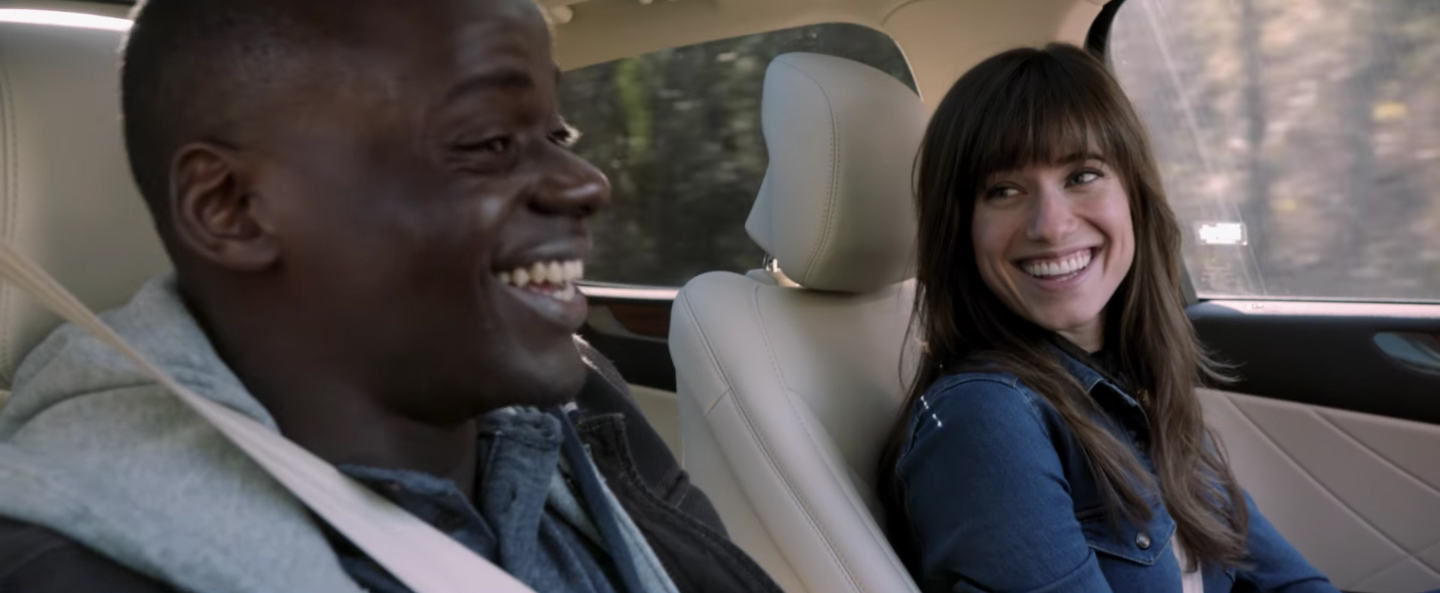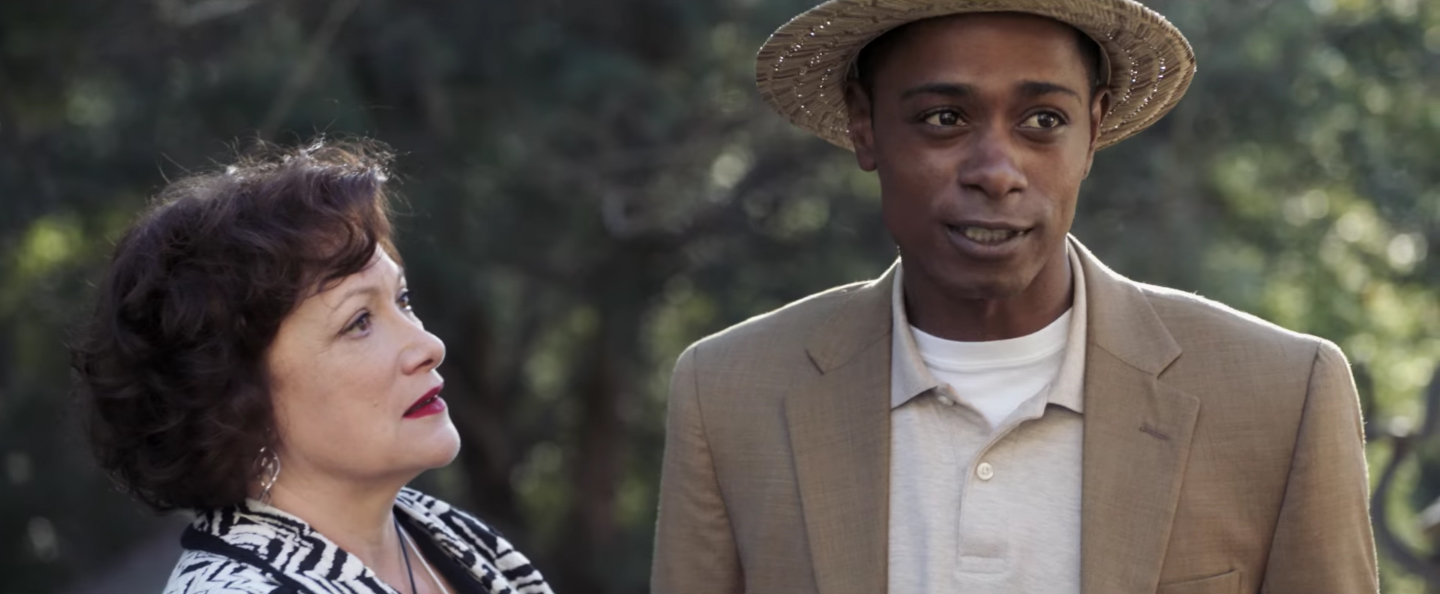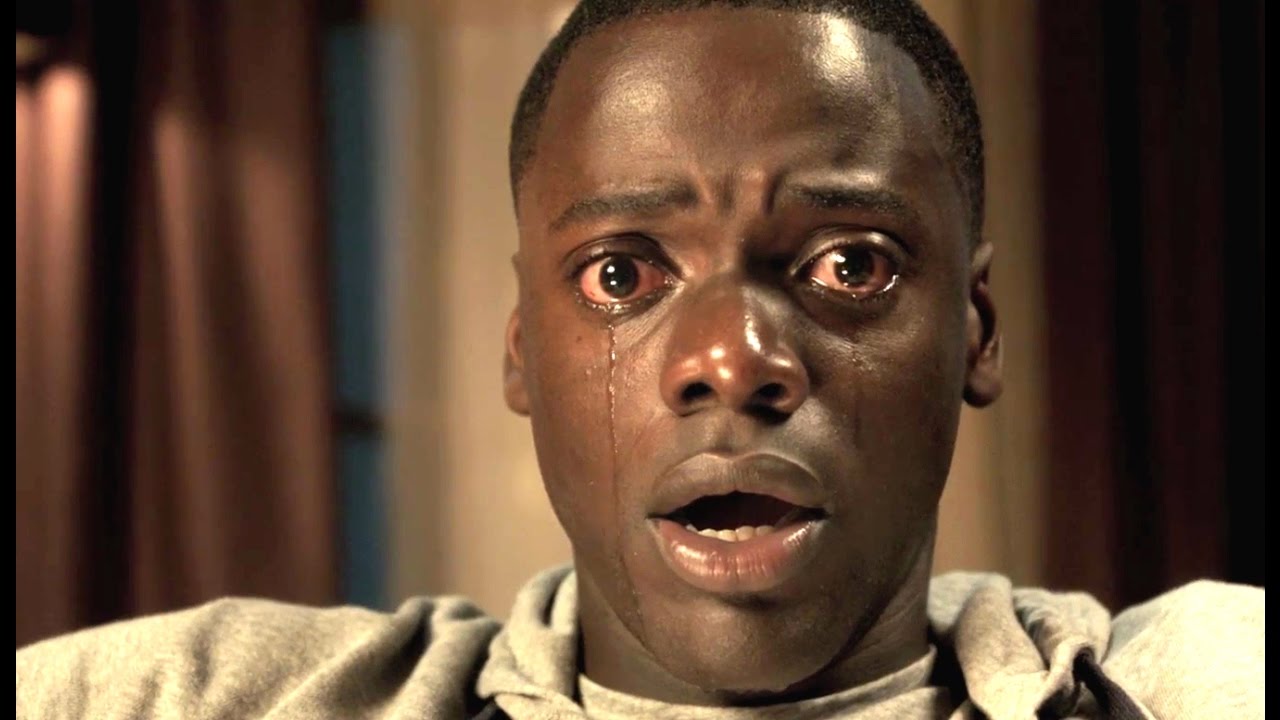At a pivotal moment in Jordan Peele’s unbelievably assured horror debut Get Out, something snaps in one of the characters, and he delivers the title’s imperative with wide-eyed urgency to our protagonist Chris (Daniel Kaluuya). “GET. OUT.”
It’s an appropriately self-referential moment for a film that knows exactly what it is doing. Simultaneously conjuring the slyly knowing Halloween episodes of Peele’s defunct sketch comedy show Key and Peele and the meta-riffing of Don’t, Edgar Wright’s short parody contribution to Grindhouse, it’s both a funny and frightening sequence.
Even more relevant to Get Out, though, it also evokes Eddie Murphy’s joke in Delirious, imagining haunted house flicks like Poltergeist cast with Black characters instead of white bourgeois ones. (“We got a chandelier hanging up here, kids outside playing. Its a beautiful neighborhood. We ain’t got nothing to worry about. I really love it this is really nice.” “GET OUT!” “Too bad we can’t stay, baby!”)
Murphy plays the angle entirely for a barbed laugh, but Peele takes it more or less seriously, infusing the joke with a huge amount of unease. The result is a smart, overtly political scare film that only occasionally allows for either giggles or screams — sometimes to its detriment.
But on the whole, it works. Get Out is the nightmare, refracted through a deep familiarity with horror tropes, of the Black experience of liberal white pieties. With every suspiciously over-accommodating smile, every attempt to smooth over difference by “relating,” and every impulse on Chris’ own part to shrug off the mounting weirdness for the sake of getting along, we’re drawn closer to the edge. When the unthinkable arrives, we knew, of course, that it was there all along.

Chris and his girlfriend-of-four-months Rose (Girls‘ Allison Williams) are spending the weekend at her parents’ tony country house, a first for the couple. The normal tremors of meeting a significant other’s folks loom even larger here because Chris is Black and she’s white; Peele emphasizes, without putting too fine a point on it, the degree to which he realizes this matters and she either doesn’t or can’t. It is the first of many occasions when Chris will have to sigh and go with the (white) flow.
Things get off to a bad start when they hit a deer on the way out to the house, prefiguring a number of motifs that Get Out has up its sleeve. Rose’s parents Missy (Catherine Keener) and Dean (Bradley Whitford, building on Cabin In The Woods to solidify his place in the meta-horror genre) are hospitable but odd. Dean, in particular, is ingratiating to a fault, saying things like, “‘Sup, my man!” and singing the praises of getting to know other cultures through their art. Oh, and he “would’ve voted for Obama a third time” if he could.
To Rose, he’s just being a goofy dad. To Chris, this is getting mighty close to someone asking him if they can touch his hair. A later conversation about sports is cringe-worthy.
But all that watch-it-between-your-fingers cringe-comedy dissipates as it becomes clear something else is afoot. For one thing, why are the handful of Black folks — a maid, a groundskeeper, the lover of a much older white woman — behaving so strangely? Why does Chris’ cell phone keep getting unplugged? And why is the basement door sealed shut?

Peele wears his references on his sleeve (The Stepford Wives and Under The Skin both get a workout here), seemingly having the time of his life deploying familiar horror beats to expose something much closer to the surface than arcane mythologies. Get Out generates as much tension from the macabre atmosphere and its implications (old tricks) as from a cop car approaching a Black man at night in a white neighborhood (a decidedly contemporary one). This makes it one of the more vital horror movies likely to come out this year.
It’s hard to say much more and keep this spoiler-free. There’s little doubt, though, that Peele is a huge talent, delivering a gorgeously shot, expertly paced, well-acted horror movie that never holds back from the implications of its premise. It’s certainly not the first genre movie to grapple with race through the prism of comic-horror tropes — this has been a constant from Mercy, The Mummy Mumbled through Candyman — but it’s unusually stealthy about it, focusing on the benevolent self-image of white supremacy and landing on a kind of shell-shocked outrage that the viewer recognizes through the in-jokes.
If Get Out tilts occasionally too much to the comic rather than the horrifying for my taste, it’s still an absurdly impressive writer/director debut from Peele. And as I’ve argued repeatedly here, in a different context, one of the strengths of the genre is its ability to construct metaphors that glimpse the lived anxieties of modern existence, placing them in a space of heightened reality where they can be called by their names. Get Out is a substantial contribution to that tradition.

